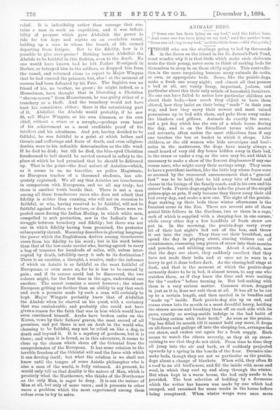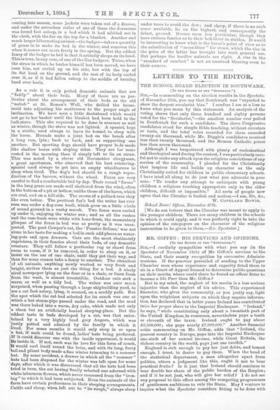ANIMALS' BEDS.
[" Some eno has been lying on my bed," said the father bear. "And some one has been lying on my bed," said the mother bear. "Some one is lying in my bed," said the little bear.—Old Fairy-tale.] THOSE who see the starlings going to bed by thousands in the ilexes on the island in the St. James's Park Pond, must wonder why it is that birds which make such elaborate nests for their young, never seem to think of making beds for themselves to sleep in on these chilly nights. This contradic- tion is the more surprising because many animals do make,' or own, or appropriate beds. Some, like the prairie-dogs,' make a fresh one every night ; and almost all that possess a bed at all, are vastly fussy, important, jealous, and particular about this their only article of household furniture. ! No one can have failed to notice how particular children are about their beds,—how much they object to have them' altered, how they insist on their being "made" in their own way, and how they carry their newest and most valued possessions up to bed with them, and poke them away under the blankets and pillows. Animals do exactly the same; and a pet dog which has the run of a whole house during the day, and is on the friendliest terms with master and servants, often makes the most ridiculous fuss if any one touches the box or basket in which it sleeps. Like children, or the old women who hide sovereigns and banl-- notes in the mattresses, the dogs have nearly always a small hoard of very old dry bones hidden away in their bed,' in the straw or under a rug, as the case may be, and think it necessary to make a show of the fiercest displeasure if any one comes near, who might carry their savings away. They seem to have a provident instinct, like the little boy whose fears were so aroused by the rumoured announcement that a "general fast " was to be held, that he hid away bits of bread and ' cheese in the linings of the family coach, and in his own and his sisters' beds. Prairie-dogs ought to take the plane of the stupid' guinea-pigs as pets, if only because they throw away their old bed every day, and make a new one. The sight of the prairie- dogs making up their beds these winter afternoons is the funniest scene in the Zoo. There are several sets of these genial little fellows in the Gardens, two or three in a cage,' each of which is supplied with a sleeping-box in one corner, while every other day a few handfuls of fresh straw are put in. In the morning, the prairie-dogs carry every bit of their last night's bed out of the box, and throw it out into the cage. They then eat their breakfast, and spend the day in playing about, staring visitors out of countenance, cramming long pieces of straw into their mouths and pouches, and nibbling oarrots. About 3 o'clock, now that the days are short, they suddenly recollect that they have not made their beds, and at once set to work in a hurry to get it done before dark. As the closing-bell rings at dusk, and that is the moment at which the prairie-dogs earnestly desire to be in bed, it almost seems, to any one who watches them, as if they knew the time and were waiting for the " curfew " before turning in But bed-making with them is a very serious matter. Common straw, dragged in just as it is, does not suit them at all. It has all to be cut up to a certain length, and then carried in in bundles and "made up" inside. Each prairie-dog sits up on end, and crams straw into its mouth in a most dreadful harry, holding the straws across and breaking them off on each side with its paws, exactly as sewing-maids indulge in the bad habit of " breaking cotton with their teeth." As soon as the prairie. dog has filled its month till it cannot hold any more, it drops on all-fours and gallops off into the sleeping-box, arranges the cut straw, and rushes out again for a fresh supply. Each seems to watch the others severely, as they sit up straw- cutting to see that they do not shirk. From time to time they all jump into the air and bark, as if suddenly projected upwards by a spring in the boards of the floor. Dormice also make beds, though they are not so particular as the prairie. dogs about a change of blankets. When wild, they often fit a roof to an old bird's-nest, and fill the inside with moss and wool, in which they curl up and sleep through the winter. But when kept in a warm house, the bed only needs to be provided. The best selection of bedding by a dormouse which the writer has known was made by one which had escaped, and remained for some weeks in the house before being recaptured. When winter wraps were once more
coming into season, some jackets were taken out of a drawer, and under the astrachan collar of one of these the dormouse was found fast asleep, in a bed which it had nibbled out in the cloth, with the fur on the top for a blanket. Another and much larger hibernating animal—the badger—takes a quantity of grass in to make its bed in the winter, and removes this when it comes out more freely in the spring. But the oddest fancy of the badger in bed is that it actually sleeps on its head. This is true, in any case, of one of the Zoo badgers. Twice, when the straw in which he buries himself has been moved, we have seen him, not curled up on his side, but with the top of its flat head on the ground, and the rest of its body curled over it, as if it had fallen asleep in the middle of turning bead over heels.
As a rule it is only petted domestic animals that are `.faddy" about their beds. Many of these are as par- ticular about the arrangement of their beds as the old i" nabob" at St. Ronan's Well, who drilled the house- maid into adjusting his mattresses to the proper angle of inclination. We have seen a little dachshund which would not go to her basket until the blanket had been held to the hall-stove. This she required to be done in summer as well as winter, though the stove was not lighted. A spaniel, kept in a stable, used always to leave its kennel to sleep with the horse. Hounds make a joint bed on the bench after a long run, lyin;; back to back, and so supporting one 'another. But sporting dogs should have proper beds made like shallow boxes with sloping sides. They are far more rested in the morning than if simply left to lie on straw. This was noted by a clever old Devonshire clergyman, a great sportsman, who observed that his best retrieving- /spaniel used always to get into an empty wheelbarrow to 'sleep when tired. The dog's bed should be a rough repro- 'duotion of the barrow, without the wheel. Foxes are very icareful to find a comfortable bed by day. Their round "forms" in the long grass are made well sheltered from the wind, often in the bottom of a pit or hollow, unlike those of the hares, which are oval, and on a hill-side. The crown of a pollard-tree they ',like even better. The prettiest fox's bed the writer has ever seen was under a dog-rose bush, which grew on a little circle of sound ground in a rushy marsh. Two foxes were curled up under it, enjoying the winter sun ; and as all the rushes land the rose-bush were white with hoar-frost, the momentary glimpse of the foxes in bed was as pretty as it was unex- pected. The poet Cowper's cat, the Pensive Selima,' was not alone in her taste for making a bed in such odd places as water. lug-pots and open drawers. Cats are the most obstinately capricious, in their fancies about their beds, of any domestic creature. They will follow a particular rug or shawl from room to room, if it be removed, in order to sleep on it, or insist on the use of one chair, until they get their way, and then for some reason take a fancy to another. The cleanliest ',then all animals, anything newly washed or very fresh and Ibright, strikes them as just the thing for a bed. A nicely aired newspaper lying on the floor or in a chair, or linen fresh from the wash, is almost irresistible. Outdoor cats seek a warm as well as a tidy bed. The writer was once much surprised, when passing through a large shipbuilding yard, to see a cat fast asleep, lying, it seemed, on a muddy path. But the spot which the cat had selected for its conch was one at which a hot steam-pipe passed under the road, and the mud was there baked into a warm, dry cake, which made not only a clean but an artificially heated sleeping-place. But the oddest taste in beds developed by a cat, was that enter- tained by a very highly bred grey Angora, which was justly petted and admired by the family in which it lived. For some months it would only sleep in or upon a hat, if such could be found, ladies' hats being preferred. If it could discover one with the inside uppermost, it would lie inside it. If not, such was its love for this form of conch, It would curl itself round the brim, and with its long, furry tail and pliant body made a fine winter trimming to a summer hat. By some accident, a drawer in which all the " summer " 'hats had been disposed for the winter was left open for some days, after which it was discovered that all the hats had been tried in turn, the cat having finally selected one adorned with white laburnum flowers, which never recovered from the " iron- ing " to which it had been subjected. Even the animals of the farm have certain preferences in their sleeping arrangements. Cattle and sheep, when left out to " lie rough," always sleep
under trees to avoid the dew ; and sleep, if there is no such cover available, lie on the highest, and consequently the driest, ground. Horses seem less particular, though they have curious fancies as to their bed-litter in stables. It would be interesting to know what is the horse's point of view as to the substitution of " moss-litter " for straw, which the rise in the price of the latter has brought into such general use. But perhaps the hardier animals are right. A rise in the "standard of comfort" is not an unmixed blessing even to their owners.



















































 Previous page
Previous page